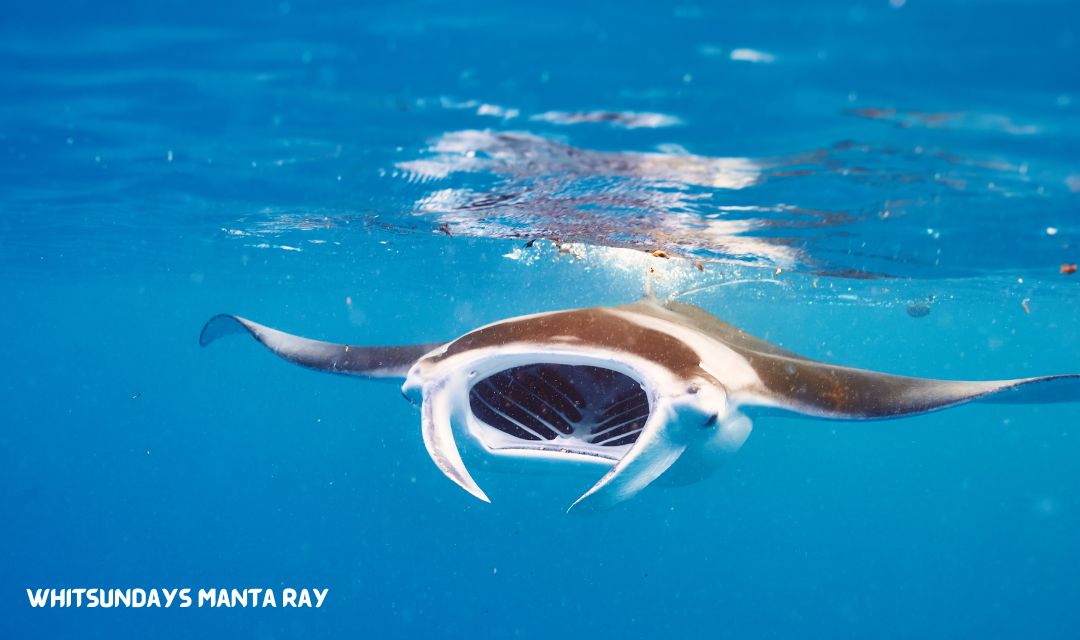The Majestic Manta Rays In The Whitsundays
Would you like to spot Manta Rays in the Whitsundays? Renowned for their stunning marine life, manta rays are among the most majestic creatures you can encounter. This article explains the intriguing world of manta rays in the Whitsundays, exploring their habitat, behaviours, and the best locations to spot them.
Manta Ray Habitat
The Whitsunday Islands, part of the Great Barrier Reef, provide an ideal habitat for manta rays. These areas boast rich marine biodiversity, making them perfect spots for reef diving. Locations like Bait Reef and Manta Ray Drop Off are renowned for their underwater landscapes and abundant marine life.

Whitsundays Manta rays
Life of Manta Rays
Intelligence and Behavior
Manta rays are highly intelligent and exhibit long-term memory, capable of mapping their environment using sight and smell. They even regularly visit “cleaning stations” where smaller fish like wrasse clean their bodies of dead skin and parasites. This intriguing behaviour is detailed on the University of Queensland’s website.
Reproduction
Manta rays give birth approximately every two years, usually to a single pup. The gestation period lasts 12-13 months, after which the fully developed young are born ready to fend for themselves. Manta rays can live up to 50 years in the wild, making their long-term survival closely tied to the health of their environment.
Spotting Manta Rays in the Whitsundays
Prime Diving Spot
Manta Ray Bay, located on the northern end of Hook Island, is a top diving and snorkelling spot known for its vibrant marine life, caves, valleys, and swim-throughs. This area provides an incredible opportunity for divers to explore and witness the graceful movements of manta rays up close.
Best Times to Visit
The best time to see manta rays in the Whitsunday Islands is during the cooler months, from May to September. The cooler waters attract these gentle giants, making it a prime season for trying to swim with Manta Ray experiences.

Whitsundays Manta rays
Facts About Manta Rays
- Size: Manta rays can have a wingspan of up to 7 meters and weigh up to two tonnes.
- Harmless: Despite their massive size, they are completely harmless to humans.
- Unique Markings: Each manta ray has unique underside markings akin to human fingerprints.
- Brain Size: They have the largest brain to body weight ratio of any living fish.
For additional interesting pieces of information, you can refer to Five fascinating facts about manta rays.
Threats to Survival
Human activities pose significant risks to manta rays. Overfishing, pollution, and habitat degradation are leading threats. Since manta rays have long lifespans and slow reproductive rates, overfished populations cannot easily recover. This is highlighted by their vulnerability on the IUCN Red List.
Whitsundays Manta Rays FAQ
When is the best time to see mantarays in the Whitsundays?
The best time to see manta rays is during the cooler months from May to September when they are more likely to be spotted in the Whitsunday waters.
Where is Manta Ray Bay located?
Manta Ray Bay is located on the northern end of Hook Island, known for its excellent diving conditions and diverse marine life. See Manta Ray Bay on Google Maps.
Are manta rays dangerous to humans?
No, mantarays are harmless to humans and are known for their gentle nature.
Check Out All The Tours
Looking to visit Whitehaven Beach or the Great Barrier Reff, see all the tours.
More Great Barrier Reef Information
Get in Touch
Have Questions?
Ask Nath J
74 Whitsunday Islands 1 Whitehaven Beach
Hi, I’m Nath J, a long-time local who’s been lucky enough to live and work tourism in the Whitsundays since 2001.
Over the past two decades, I’ve helped visitors discover the best of this incredible region, from Whitehaven Beach and Hill Inlet to the hidden spots only locals know about. I started out managing boats and tours, and these days I run Ripple Effect Online, a tourism-focused digital marketing business helping local operators grow and connect with travellers like you.
I’ve written an ebook called Whitsunday Islands: A Journey through Paradise, created countless local travel guides, and earned recognition as a “Whitsundays Tourism Hero” from QTIC for my contribution to the region and gained First Nations Cultural Protocol training through QTIC as well. But more importantly, I’ve spent years listening to travellers, understanding what makes a trip unforgettable, and helping people plan the kind of experience they’ll talk about for years.
If you’re planning a visit to Whitehaven Beach or anywhere in the Whitsundays, I’m here to help you make it amazing.
Find me on Facebook and LinkedIn or drop me an email at info@nath-j.au.
